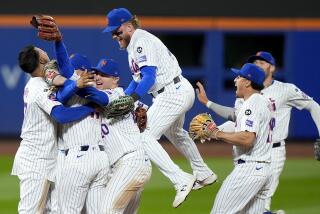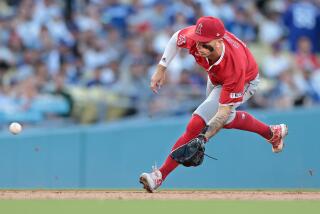In Like a Lion : Mets’ Jeff Kent Is Enjoying an Explosive Start to the 1994 Season
- Share via
It isn’t only the predominant color of the New York Mets’ uniform that prompts Manager Dallas Green to think of second baseman Jeff Kent as blue collar. It’s his “nose-in-the-dirt, grind-it-out” approach, Green said.
The manager also colors Kent in shades of Pete Rose.
“He treats every at-bat as if it’s the seventh game of the World Series,” Green said. “He can go three for four and come away mad at himself because of the hit he didn’t get. If more guys had his determination and pride it would be a better industry for all of us.”
Calling it pride and determination born of a fear of failure, the hard-edged discipline he learned as the son of a Costa Mesa police lieutenant, Kent took root in the misery of the Mets’ 103 defeats last season and has blossomed spectacularly.
He arrives at Dodger Stadium tonight with a .423 batting average. He leads the major leagues with 22 runs batted in and is tied for the major league lead with eight home runs. In 88 games since July 4, he has batted .324 with 23 home runs and 75 RBIs.
His 1994 pace projects to 99 homers and 274 RBIs. Those, of course, are fantasy league numbers, even with an allegedly juiced baseball, and beyond the reach of Clark Kent, let alone Jeff.
A more realistic possibility is that he will break the major league record for April homers, 11, shared by Willie Stargell, Graig Nettles and Mike Schmidt.
He was last week’s National League player of the week but said that has no relevance because he is interested only in where he and his team are at the finish. The spotlight, he said, doesn’t interest him.
“I’m not dumb,” he said in San Diego the other night. “I know what I’ve done. But when I walk out of here tonight, I have to start thinking about tomorrow.”
“The start is a positive for me in that it helps build confidence, but I don’t take it seriously because I know how quickly the game can turn on you. I feel I’m going to continue to improve and get better, but I hope people don’t expect me to play at an uncommon level because it’s not going to happen.”
It already has, however. This is not simply a shower of April hits. The 26-year-old graduate of Huntington Beach’s Edison High has been performing at an uncommon level since last July, proving to those who said he belonged at third base that he can handle second and hit at the major league level.
And helping to prove, as well, that when the Mets traded pitcher David Cone and his salary demands as a prospective free agent to the Toronto Blue Jays in late August of 1992, they received two cornerstones--Kent and center fielder Ryan Thompson--for what figures to be a long rebuilding process.
The talented Thompson has been slower to stand out than Kent, but after hitting 11 homers in 80 games of New York’s disruptive 1993 season, he has three this season, with 12 RBIs and a .317 average.
The 6-foot-1, 185-pound Kent spent three minor league seasons with the Toronto organization, then, without triple-A experience, started the 1992 season with the Blue Jays when Kelly Gruber was injured. He hit eight home runs and batted .240 in 65 games before the trade.
“I had mixed emotions,” he said of the deal. “On one hand I felt that I had helped put Toronto in position to win and my job wasn’t over, but on the other, I knew I had the opportunity to play regularly with the Mets and I’m not sure that would have happened as quickly if I had stayed in Toronto.”
Kent batted .239 over the final 37 games with New York in ‘92, then caught fire at mid-season last year, angered by a three-day benching in late June. He finished with a .270 average, 21 homers and 80 RBIs in his first major league season as a regular.
He also made 18 errors, high among National League second basemen, but his manager resisted media recommendations that Kent be moved back to third because of limited range and that Bobby Bonilla, now playing third, should be at first base, since occupied by David Segui.
“A lot of people didn’t think Jeff could hit in the big leagues or play second base, but I’m proud of where he is and the improvements he’s made,” Green said.
“He would tell you himself that he’s not Roberto Alomar or Bill Mazeroski, but he turns the double play as well as anyone and he’s still learning the position. I think he earned the chance last year to solidify himself there.”
Green also thinks that Kent, with his potential of 30 or more homers a year, brings an added dimension to that position. Kent hopes he has changed positions for the last time.
“I like second base,” he said. “I like turning the double play. I like the control you feel in the middle of the infield.
“They’ve told me that nothing is etched in stone, but I feel that second base is where I belong until somebody beats me out or the organization says I have to move. In that case, I’d just have to adjust and deal with it.”
Kent has experience with adjusting. He quit the Edison team as a senior after three years as a starting shortstop when he clashed with then-coach Ron La Ruffa.
He wasn’t drafted after high school and didn’t attract wide college interest until he signed with California after a summer of Connie Mack League play. He was the sophomore shortstop on the Cal team that reached the College World Series but broke his wrist as a junior and wasn’t drafted by Toronto until the 21st round in 1989.
A demanding father taught him to drive through the roadblocks, to throw up his “focus wall” when he hears too much from too many people and reads too much of the same thing, he said.
“If it wasn’t for my upbringing, I wouldn’t have the drive that got me here,” he said. “I’m not sure I’ll raise my kids the same way, but I thrive on the negative, the fear of failure.
“I never want to embarrass myself or my team. I hate to lose, and I’m my own worst critic. I don’t consider myself an All-Star or Hall of Fame guy, but I’ll never settle for second best either. I mean, no one is harder on me than I am, and that translates to the fire I need to succeed.”
The focus wall is vital for the player who lives on emotion and doesn’t consider himself a people person. In fact, the Orange County beach boy has been driven to Texas by the overcrowding in his home state. He and wife Dana recently built a home in Austin, which Kent fell in love with while playing in an NCAA regional with Cal.
“I always wanted to be a cowboy when I was a kid,” he said. “I’m not a cowboy yet, but I love the open space.”
The blue-collar Kent would also seem to have found some space in the statistical neighborhood occupied by the major leagues’ top hitters.
More to Read
Go beyond the scoreboard
Get the latest on L.A.'s teams in the daily Sports Report newsletter.
You may occasionally receive promotional content from the Los Angeles Times.










